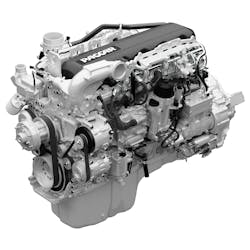Kenworth Truck Company and Peterbilt Motors Company, divisions of Paccar Corp., recently announced the availability of the next generation of Paccar engines, developed to meet the Environmental Protection Agency’s 2013 emissions requirements. The Paccar MX-13, Paccar PX-9 and Paccar PX-7 engines are designed to maximize fuel efficiency and reliability while providing a low total cost of ownership. They replace the Paccar MX, Paccar PX-8 and Paccar PX-6, respectively.
According to Kenworth, all of the new Paccar engines have a new engine Electronic Control Module (ECM), developed to accommodate the tightening of onboard diagnostic detection windows. Changes to the after-treatment components include a new sensor and redesigned electronics packaging for improved reliability. On the SCR canister, there will be a new ammonia (NH3) sensor used to monitor the DEF dosing performance and improved packaging of the sensor control units.
Kenworth customers can now specify the new engines in Kenworth truck orders placed through Kenworth dealers in the United States and Canada for delivery in 2013. The new Paccar engine lineup will also be available for Peterbilt’s complete range of medium and heavy-duty products beginning in 2013.
“The integration of Paccar engines into Peterbilt vehicles provides an outstanding solution to our customer’s operational needs,” said Bill Kozek, Peterbilt general manager and Paccar vice president. “The new Paccar engines were developed to combine increased fuel economy with industry-leading reliability, resulting in maximum operating efficiency.”
“The new engine line-up further strengthens Kenworth’s vertical integration,” said Judy McTigue, Kenworth director of marketing planning and research. “Paccar’s latest engine technology provides efficient and productive performance for customers in a wide range of truck applications.”
The 12.9-liter Paccar MX-13 engine is designed for heavy-duty truck applications in both vocational trucks and on-highway tractors. It is available in a wide range of horsepower ratings starting at 380 hp. with torque offerings up to 1850 lb-ft of torque.
Additional Paccar MX-13 engine enhancements include a common-rail fuel system that maintains injection pressures of 2,500 bar, providing improved efficiency. According to the companies, the result is finer fuel atomization and more ways to optimize combustion, helping to provide the lowest possible fuel consumption, emissions and noise levels.
“The advanced engine software, sensors and actuators also play an important role in this respect, functioning faster with increased precision to ensure that the best possible mixture of air, fuel and exhaust gases are used at all times,” said Landon Sproull, Peterbilt chief engineer. “Our testing indicates significant fuel economy improvements that will further improve operational costs for our customers.”
The new MX-13 is available for Peterbilt’s new Model 579 as well as Peterbilt’s models 587, 386, 384, 389,388, 367 and 365. It is available for Kenworth Class 8 T660,T680, T700,T800 and W900 models.
“The new PACCAR MX-13 engine offers a wide range of horsepower and torque ratings to meet customer power requirements. This engine opens the Kenworth door to additional customers in vocational applications, including logging, dumps and hauling applications over 100,000 lbs.,” said McTigue.
The 8.9-liter PACCAR PX-9 engine has one of the highest power-to-weight ratios in its class, according to the companies, with heavy-duty features like replaceable wet liners, roller cam followers, bypass oil filtration and targeted piston-cooling. The 8.9-liter Paccar PX-9 engine is available in both medium and heavy-duty configurations with horsepower ratings from 260 hp to 380 hp and provides up to 1,250 lb/ft. of torque.
Iti s available for Peterbilt’s regional haul Model 382, specialty application market Model 348 and the Model 320, a low-cab-forward vehicle especially suited to refuse markets. For Kenworth customers, the PX-9 is available in medium- and heavy-duty models, including the T270, T370, T440, T470 and W900S.
The 6.7-liter Paccar PX-7 engine was developed to deliver superior performance, minimize operational costs and maximize uptime for medium-duty customers. It is available in horsepower ratings from 200 hp to 325 hp and offers up to 750 lb/ft. of torque.
It is available for Kenworth’s medium-duty conventional and cabover line-up, including the Kenworth T170, T270 and T370. For the Kenworth K270 and K370 cabovers, the PX-7 ratings are 220-hp /520 lb-ft, 240-hp/560 lb-ft and 250-hp/660 lb-ft.
The PX-7 is available for Peterbilt’s entire medium duty product line including Models 330, 325, and Models 210 / 220, which are especially suited to pickup and delivery, towing, refrigerated van, roll-off and landscaping applications.
About the Author
Wendy Leavitt
Wendy Leavitt is a former FleetOwner editor who wrote for the publication from 1998 to 2021.
